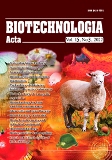ISSN 2410-7751 (Print)
ISSN 2410-776X (Online)

Biotechnologia Acta V. 15, No. 3, 2022
P. 35-41. Bibliography 16, Engl.
UDC: 547.361; 577.151.158
https://doi.org/10.15407/biotech15.03.035
CHEMICAL MUTAGENESIS OF THE LYSINE-PRODUCING STRAIN Brevibacterium sp. IMV B-7447
Andriiash G. S., Beiko N. E., Tigunova O. O., Shulga S. M.
State Enterprise “Institute of Food Biotechnology and Genomics of the National Academy of Sciences of Ukraine”, Kyiv
The aim of the work was to obtain a producer strain with increased lysine accumulation using the chemical mutagenesis method.
Methods. To achieve the goal, we used the method of treating the lysine-producing strain with the chemical mutagen N-methyl-N-nitro-N-nitrosoguanidine, cultivating the resulting clone and determining the accumulation of lysine in flasks and a bioreactor.
Results. The optimal concentrations and duration of mutagen action for the production of mutant microorganisms were found. Сlones with the maximum lysine accumulation were selected. Mutagenesis was carried out consecutively three times. As a result, lysine-producing strain Brevibacterium sp. IMV B-7796 auxotrophic regarding leucine and threonine with maximum accumulation of the target amino acid was obtained.
Conclusions. The lysine producer Brevibacterium sp. IMV B-7796 was obtained, which produced 65.0 g/dm3 of lysine in a bioreactor under conditions of periodic cultivation with feeding. The Brevibacterium sp. IMV B-7796 strain was proposed as a basis for the creation of a genetically modified strain with increased accumulation of lysine for further use in industrial lysine technology.
Key words: Brevibacterium sp., lysine, chemical mutagenesis, producer strain.
© Palladin Institute of Biochemistry of National Academy of Sciences of Ukraine, 2022
References
1. Gopinath V., Nampoothiri K. M. Corynebacterium glutamicum. In: Batt C. A., Tortorello M. L. (Eds.), Encyclopedia of Food Microbiology, vol 1. Elsevier Ltd, Academic Press. 2014, pp. 504–517. https://doi.org/10.1016/B978-0-12-384730-0.00076-8
2. Ikeda M. Lysine fermentation: history and genome breeding. Adv Biochem Eng Biotechnol. 2016, 159, 73–102. https://doi.org/10.1007/10_2016_27
3. Becker J., Rohles C. M., Wittmann, C. Metabolically engineered Corynebacterium glutamicum for bio-based production of chemicals, fuels, materials, and healthcare products. Metabolic Engineering. 2018, 50, 122?141. https://doi.org/10.1016/j.ymben.2018.07.008
4. Pfefferle W., M?ckel B., Bathe B., Marx A. Biotechnological Manufacture of Lysine. In: Microbial Production of l-Amino Acids. Advances in Biochemical Engineering/ Biotechnology, Springer, Berlin, Heidelberg. 2003, 79, 59?112. https://doi.org/10.1007/3-540-45989-8_3
5. Wittmann C., Becker J. The l-Lysine Story: From Metabolic Pathways to Industrial Production. Microbiology Monographs. 2007, 5, 39–70. https://doi.org/10.1007/7171_2006_089
6. Kelle R, Hermann T, Bathe B. L-lysine production. In: Eggeling L, Bott M (eds) Handbook of Corynebacterium glutamicum. CRC Press, Boca Raton, Fl, 2005, pp. 465–488. https://doi.org/10.1201/9781420039696
7. Ikeda, M. Amino Acid Production Processes. In: Microbial Production of l-Amino Acids. Advances in Biochemical Engineering/Biotechnology, Springer, Berlin, Heidelberg. 2003, 79, 1–35. https://doi.org/10.1007/3-540-45989-8_1
8. Ang, F.S., Khaw, S.Y., Few, L.L., W. C. See Too, A. L. Chew Isolation of a Stable Astaxanthin-Hyperproducing Mutant of anthophyllomyces dendrorhous Through Random Mutagenesis. Appl Biochem Microbiol. 2019, 55, 255?263. https://doi.org/10.1134/S0003683819030025
9. Binder, S., Schendzielorz, G., St?bler, N., Krumbach K., Hoffmann K., Bott M., Eggeling L. A high-throughput approach to identify genomic variants of bacterial metabolite producers at the single-cell level. Genome Biol. 2012, 13, R40. https://doi.org/10.1186/gb-2012-13-5-r40
10. F?lix F. K. do C., Letti L. A. J., Vin?cius de Melo Pereira G., Bonfim P. G. B., Soccol V. T., Soccol C. R. L-lysine production improvement: a review of the state of the art and patent landscape focusing on strain development and fermentation technologies. Critical Reviews in Biotechnology. 2019, 1–25. https://doi.org/10.1080/07388551.2019.1663149
11. Andriyash H. S., Zabolotna G. M., Bondarenko V. S., Shula S. M. Gene 16S rRNA sequence phylogenetic analysis of lysine producers strains. Biotechnol. Acta. 2014, 6, 40?45. https://doi.org/10.15407/biotech7.06.040 (In Ukrainian)
12. Fedorenko V. O. A large workshop on genetics, genetic engineering and analytical biotechnology of microorganisms. Navch. Posibnyk, Lviv: vydavnychiy centr LNU imeni Ivana Franka. 2006, p. 279 (In Ukrainian).
13. Ostapchenko L. I., Kompanecapos; I. V., Skopenko O. V. Bioorganic chemistry. Praktykum: navch. posib. Kyiv, VPC "Kyivskiy universytet". 2019, p. 400. (In Ukrainian).
14. Sasongko A., Nugroho R. W., Mulyani D. Ammonia determination in bottled water using spectrophotometer: comparison between Nessler and Berthelot methods. Jurnal Sains dan Teknologi. 2018, 7(1), 126?134. P-ISSN : 2303-3142, E-ISSN : 2548-8570 https://doi.org/10.23887/jstundiksha.v7i1.13009
15. Kazunori Sawada, Masaru Wada, Takuya Hagiwara, Susumu Zen-in, Keita Imai, Atsushi Yokota. Effect of pyruvate kinase gene deletion on the physiology of Corynebacterium glutamicum ATCC13032 under biotin-sufficient non-glutamate-producing conditions: Enhanced biomass production. Metabolic Engineering Communications. 2015, 2 67–75. https://doi.org/10.1016/j.meteno.2015.07.001
16. Andriiash H. S., Sekan A. S., Tigunova О. О., Blume Ya. B., Shulga S. M. Metabolic Engineering of Lysine Producing Corynebacterium glutamicum Strains. Cytology and Genetics. 2020, 54(2), 137?146. https://doi.org/10.3103/S0095452720020024

